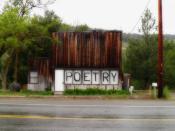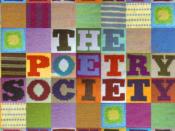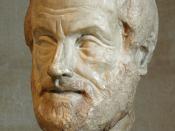Aristotle had refuted Plato's conception of imitation. Plato thought imitation to be a deviation from truth. Aristotle thought imitation to be the re-creation of something better than reality. Aristotle in Poetic says:
"Epic poetry and Tragedy, as also Comedy, Dithyrambic poetry, and most flute-playing and lyre-playing are all, viewed as a whole, modes of imitation."
Aristotle does not bring all the types of art. He speaks only of Epic poetry, Tragedy, Comedy, Dithyrambic poetry and Music. Aristotle has equated poetry with music, while Plato has equated poetry with painting. Aristotle in his opinion said that Poetry and Music have a deeper significance than painting, which is concerned with what has actually happened and with what may happen; not as in Painting which cannot go deep into reality, it is always on the surface. That's why Aristotle clinches the issue: "From what we have said it will be seen that the poet's function is to describe, not the thing that has happened, but a kind of thing which might happen, i.e.
what is possible as being probable or necessary."
Poetry, therefore, is the better form of art. It deals with eternal varieties, and not mere facts. It deals with the permanent human thoughts, feelings and action - the eternal passion, the eternal pain. The poet should imitate men who are better than they are in actual life. A poet is not an imitator. He is a maker. The term 'imitation' is to be taken in the sense of creation making. It should be remember that the poet, who is maker, does not make anything in material terms. It has no substantial existence. Yet something has been made. Such a making is not perceptible; and it can only be realised.
"Hence Poetry is something more philosophic and of graver import than...


